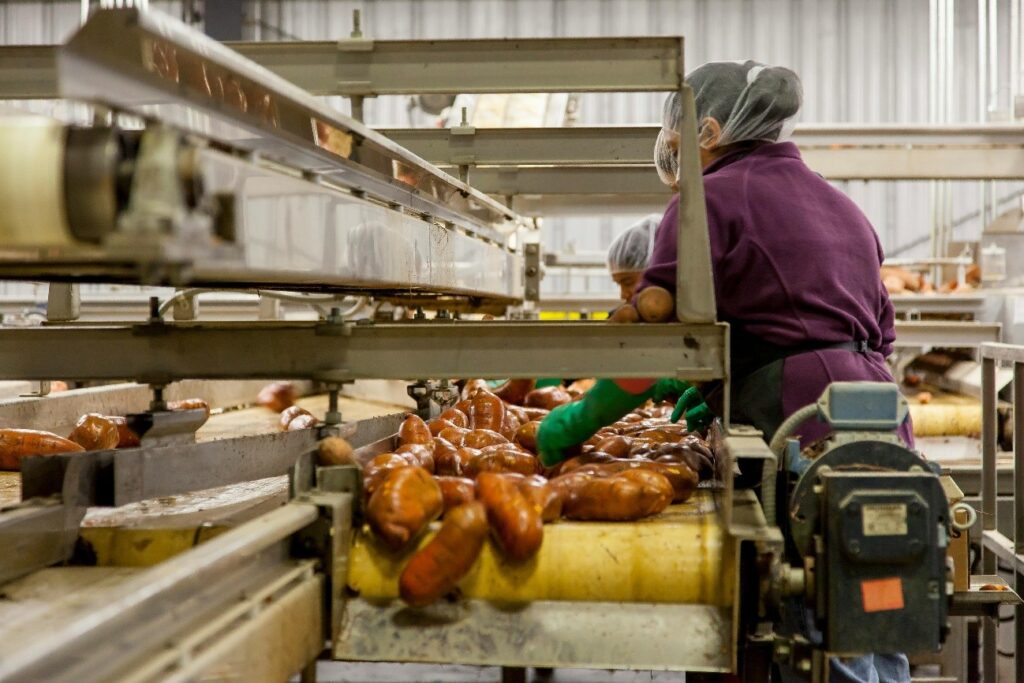The food manufacturing industry is the backbone of global nutrition, ensuring food reaches consumers safely and efficiently. Automation is revolutionizing this industry, boosting speed, food safety, and sustainability, while overcoming challenges like labor shortages and waste reduction.
The engine behind global food supply
The food manufacturing industry keeps the world fed, making sure food gets from farms to shelves. Every meal you grab from the store goes through a complex journey—sourcing ingredients, processing, packaging, and distribution. Without efficient food manufacturing, our global food supply would be in chaos. But it’s not just about making food—it’s about keeping quality high, production steady, and meeting ever-growing demand.
A brief history: From traditional methods to modern factories
Food production started with simple, hands-on techniques. Families and small businesses made food in small batches, using methods like drying, salting, and fermenting to make it last longer. Then came the Industrial Revolution, changing everything. Machines ramped up production, making food more available to more people globally.

By the 20th century, assembly lines revolutionized food processing, and innovations like refrigeration and pasteurization made food last even longer. Today, automation and data-driven processes are shaping the next chapter, pushing food manufacturing into an era of precision and sustainability.
How industrial automation is transforming food manufacturing
Food factories are becoming smarter, faster, and more precise thanks to automation. These advanced systems aren’t just making production more efficient—they’re ensuring safety, reducing waste, and solving workforce challenges. Let’s break down the key ways automation is transforming the industry:
AI-driven quality control
Advanced cameras and algorithms detect defects before products reach consumers. AI can analyze shape, color, and texture to ensure consistency.
IoT & smart sensors
Real-time tracking of temperature, hygiene, and packaging conditions prevents contamination. These sensors send alerts if any anomalies occur, preventing spoilage.
Automated packaging systems
Faster, more consistent packaging reduces waste and improves shelf life. Packaging machines can adjust based on real-time demand.
Predictive maintenance
AI predicts machine failures before they occur, reducing downtime and saving costs on emergency repairs.
Robotic food preparation
Robots handle repetitive tasks like chopping, mixing, and assembling, ensuring uniformity and hygiene in food production.
Why automation is the key to overcoming industry challenges
Even with all these advancements, food manufacturers still deal with major challenges:
- Keeping up with demand – Consumers expect fresh, high-quality food delivered quickly. As food trends shift rapidly, manufacturers must adapt.
- Food safety & regulations – Strict safety rules mean no room for mistakes. A single slip-up can lead to recalls and reputational damage.
- Labor shortages – Finding skilled workers is tough. Many roles in food production are repetitive and physically demanding, making retention difficult. This make automation crucial.
- Supply chain struggles – Global disruptions, from pandemics to political issues, impact food availability and sourcing, and pricing.
- Sustainability concerns – Food waste and high energy use put pressure on manufacturers to find greener, more efficient solutions.
Key challenges in the food manufacturing industry
The food manufacturing industry is facing increasing pressure to meet both consumer demands and operational challenges. Automation has gone from being a nice-to-have to a must-have. Factories that are adopting smart tech are seeing huge boosts in efficiency, accuracy, and sustainability. Here’s how automation is helping solve some of the industry’s biggest problems:
Boosting efficiency & speed
Automated processes speed up production, cutting down on human errors and minimizing the need for constant supervision. Machines can run 24/7, helping manufacturers keep up with high demand without sacrificing quality. Robotic systems streamline assembly lines, while AI-powered software optimizes scheduling and inventory.
Improving food safety & compliance
Automation helps maintain strict hygiene and safety standards. AI-driven systems can detect contaminants in real time, while automated cleaning solutions ensure factories stay sterile. With increasing regulations, automated tracking provides instant compliance data, reducing the risk of recalls and legal issues.
Cutting costs & optimizing resources
While automation requires a big upfront investment, the long-term savings are worth it. Robots can handle repetitive tasks, lowering labor costs and reducing mistakes that lead to waste. Smart energy management systems also help cut down on utility costs by optimizing how resources are used.
Tackling labor shortages
Labor shortages are a major headache for many food manufacturers. Automated systems can step in to handle repetitive and physically demanding jobs, allowing human workers to focus on more strategic tasks, like decision-making and maintenance. This leads to a more efficient workforce overall.
Reducing waste & improving sustainability
Food waste is a big issue for manufacturers. Automation helps reduce waste by improving precision in portioning, ingredient measurements, and packaging. AI also helps optimize the supply chain, reducing overproduction and spoilage. Plus, smart energy systems lower the carbon footprint, helping align production with global sustainability goals.
OmniConnectTM Data Cloud is the perfect platform for food manufacturers looking to tackle these industry challenges through industrial automation. By leveraging the power of AI, IoT, and real-time data analytics, OmniConnectTM streamlines production processes and enhances efficiency across the entire supply chain. The platform helps manufacturers gain valuable insights to optimize resource use, improve safety protocols, and ensure compliance with regulatory standards.
It enables seamless integration with existing systems, providing a unified view of operations to make data-driven decisions that reduce waste and boost productivity. With its robust capabilities, OmniConnectTM is a game-changer for manufacturers aiming to stay competitive and sustainable in a rapidly evolving industry. As factories adopt such advanced robotics, AI-powered decision-making, and IoT connectivity, they’re setting themselves up for long-term success in a competitive market.
The future: A fully automated food manufacturing industry?
The next decade will push automation even further. Here’s what’s coming:
Robots handling complex food prep – Machines will take on delicate tasks like decorating pastries or assembling gourmet meals.
AI-driven decision-making made common – Smart algorithms will analyze production trends and optimize everything from ingredient sourcing to packaging.
Blockchain for food transparency – Supply chains will become more traceable, reducing fraud and improving trust in food quality.
Sustainable, energy-efficient manufacturing – Factories will focus on reducing waste and lowering their carbon footprint with green automation technologies.




